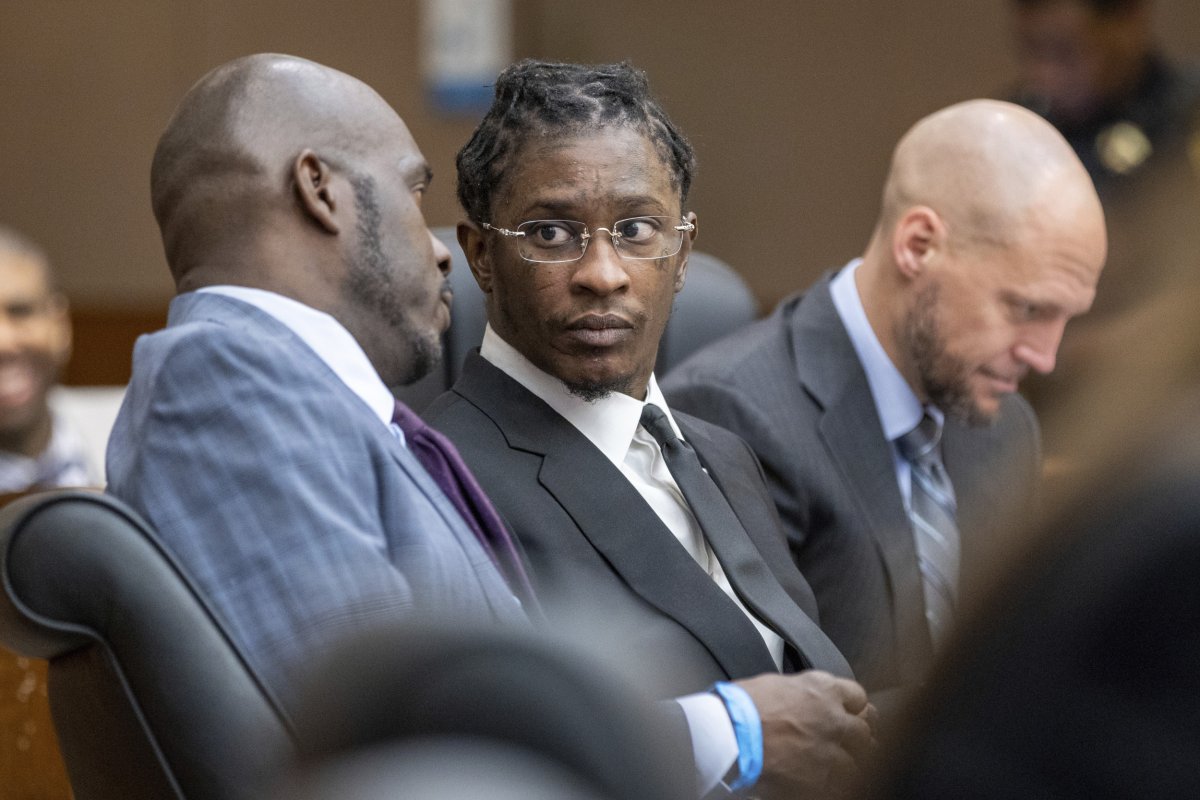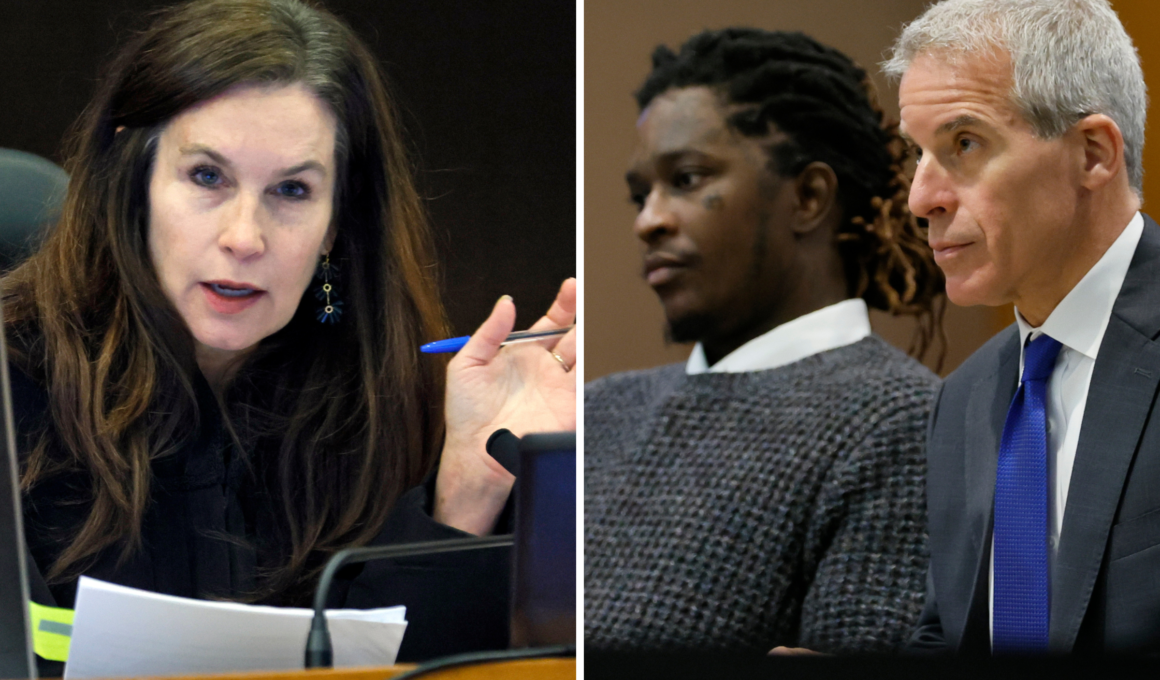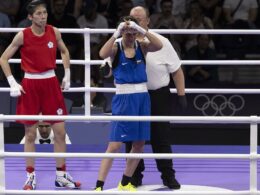The new judge in the trial of rapper Young Thug made several significant rulings this week, in the wake of proceedings that have been riddled with delays and complications, from arrests in the courtroom to the first judge being removed from the case.
Young Thug, whose real name is Jeffery Williams, is on trial in Georgia for charges related to racketeering conspiracy and participation in criminal street gang activity, along with drug and gun charges. Prosecutors allege he violated the state’s Racketeer Influenced and Corrupt Organizations (RICO) Act, which punishes offenders working under a criminal organization.
The trial has been going on for over a year, with jury selection beginning in January of 2023 and taking nearly 10 months to complete.
Fulton County Superior Court Judge Paige Reese Whitaker heard motions for mistrials and a motion for bond for Williams and other defendants in the case on Tuesday.
Whitaker is the third judge in the case.
Judges Removed, Recused from Trial
The first judge appointed to the case was Fulton County Superior Court Chief Judge Ural Glanville.
Glanville was removed on July 15 after two defendants filed motions for his recusal.
The trial was placed on hold two weeks prior to give Judge Rachel Krause an opportunity to review the motions and make a ruling.
The defendants alleged that Glanville held a meeting with prosecutors and a witness in the trial.
In her ruling, Krause wrote that “the ‘necessity of preserving the public’s confidence in the judicial system’ weighs in favor of excusing Judge Glanville.”
Fulton County Superior Court Judge Shukura Ingram was appointed to replace Glanville. She recused herself from the case two days later due to an “appearance of impropriety.”
One of her former courthouse deputies was allegedly in a romantic relationship with co-defendant Christian Eppinger. The deputy was arrested on accusations of communicating with the defendant and attempting to smuggle contraband into the jail for him.
Recent Rulings in the Case
Whitaker ruled on several key motions this week as the proceedings start up again.
She denied a motion for bond for Williams and other defendants on Tuesday.
Whitaker said she will not reconsider bond for any of the defendants despite recent events.
“I don’t know how I would have decided the bond originally,” Whitaker said. “That’s not before me. These are not the kind of changed circumstances [required under precedent], so I’m not going to reconsider the bond.”
Williams’ lawyer, Brian Steel, argued his client should be released on house arrest with strict monitoring, calling the conditions in jail “torturous.”
“He has sat through unnecessary jury selection for months, bringing in over 2,000 people when the jurors were chosen from the first 511,” Steel said. “That should not be on him. That is excess. He has now sat here for a month while the antics of Judge Glanville and [prosecutors] caused him to wander in squalor in a jail.”
Whitaker also denied two motions for a mistrial, including one filed by Williams. He claimed that his constitutional right to be present at important proceedings was violated.
The other motion argued that it was too late in the case for a new judge to take over proceedings.

Allegations of Secret Meetings
At the center of recent controversy in the case is a meeting Glanville held with prosecutors and witness Kenneth “Lil Woody” Copeland.
The meeting took place on June 10, is classified as “ex parte,” or “out of the party,” meaning a judge makes decisions without requiring all parties in a dispute to be present.
Just three days prior, Copeland was arrested in court for refusing to testify. The following Monday, he took the stand again.
Krause ruled that the meeting was proper and did not fault Glanville for it despite removing him from the case.
On Wednesday, defense attorneys learned that a second ex parte meeting between Glanville and prosecutors had taken place on June 7.
“This is gross! This is disgusting!” defense attorney Max Schardt said in court after reading the transcript of the meeting.
Courtroom Arrests
Several arrests have been made in the middle of court proceedings, including a witness, attorneys and a courtroom deputy.
Copeland was arrested for being in contempt of court. He had agreed to testify in exchange for immunity from prosecution, but then tried to invoke his Fifth Amendment right to stay silent.
Steel was arrested on June 10 after he refused to share his source for information shared in the ex parte meeting.
“Mr. Williams does not wish to move forward without me being here,” Steel said while being arrested. “You are removing me against his will, my will. You’ve taken away his right to counsel and you’re conducting material parts of this trial without me present, and I can’t learn about it by watching online.”
New Judge Sets Strict Rules
Whitaker ordered prosecutors to narrow down their list of remaining witnesses after they said they still have 105 left to call to the stand.
“This trial should not take the next seven months,” Whitaker said. “I’m not saying it won’t, but it shouldn’t.”
She also issued new rules last week aimed at making the trial more efficient, including starting at 8:45 a.m. every day and not requiring everyone to be in attendance to start proceedings for the day.
She also banned earbuds and food to help minimize distractions and encouraged professional behavior in the courtroom.
“The little bit I have seen about this case, it definitely appears that there have been times that tempers have flared a whole lot and that people have been maybe less than professional,” Whitaker said. “And I hope that this kind of breather has given everybody a breather, and everybody has been absolutely wonderful here today. But I would like for us to maintain a degree of decorum and dignity and professionalism.”
Do you have a story Newsweek should be covering? Do you have any questions about this story? Contact LiveNews@newsweek.com







